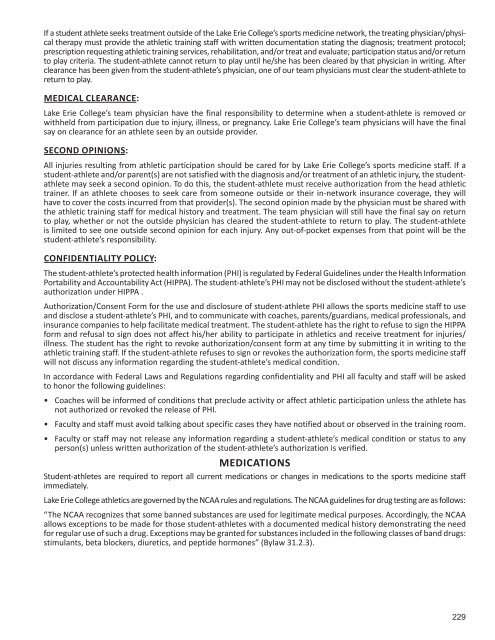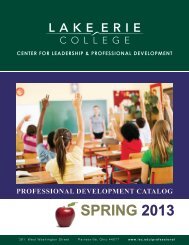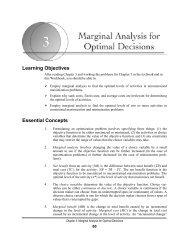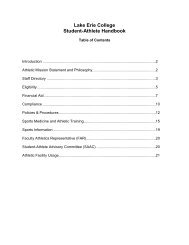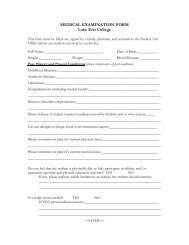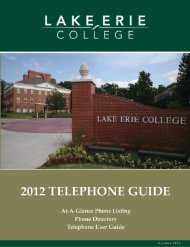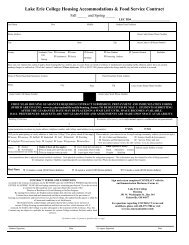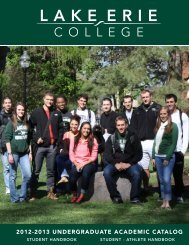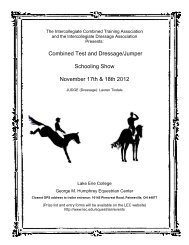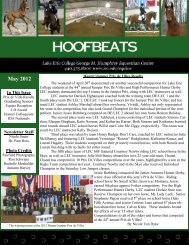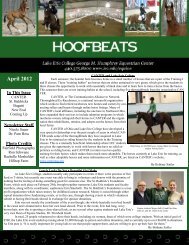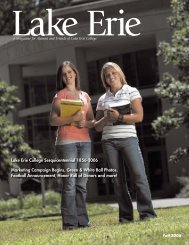Undergraduate Catalog - Lake Erie College
Undergraduate Catalog - Lake Erie College
Undergraduate Catalog - Lake Erie College
Create successful ePaper yourself
Turn your PDF publications into a flip-book with our unique Google optimized e-Paper software.
If a student athlete seeks treatment outside of the <strong>Lake</strong> <strong>Erie</strong> <strong>College</strong>’s sports medicine network, the treating physician/physical<br />
therapy must provide the athletic training staff with written documentation stating the diagnosis; treatment protocol;<br />
prescription requesting athletic training services, rehabilitation, and/or treat and evaluate; participation status and/or return<br />
to play criteria. The student-athlete cannot return to play until he/she has been cleared by that physician in writing. After<br />
clearance has been given from the student-athlete’s physician, one of our team physicians must clear the student-athlete to<br />
return to play.<br />
Medical Clearance:<br />
<strong>Lake</strong> <strong>Erie</strong> <strong>College</strong>’s team physician have the final responsibility to determine when a student-athlete is removed or<br />
withheld from participation due to injury, illness, or pregnancy. <strong>Lake</strong> <strong>Erie</strong> <strong>College</strong>’s team physicians will have the final<br />
say on clearance for an athlete seen by an outside provider.<br />
Second Opinions:<br />
All injuries resulting from athletic participation should be cared for by <strong>Lake</strong> <strong>Erie</strong> <strong>College</strong>’s sports medicine staff. If a<br />
student-athlete and/or parent(s) are not satisfied with the diagnosis and/or treatment of an athletic injury, the studentathlete<br />
may seek a second opinion. To do this, the student-athlete must receive authorization from the head athletic<br />
trainer. If an athlete chooses to seek care from someone outside or their in-network insurance coverage, they will<br />
have to cover the costs incurred from that provider(s). The second opinion made by the physician must be shared with<br />
the athletic training staff for medical history and treatment. The team physician will still have the final say on return<br />
to play, whether or not the outside physician has cleared the student-athlete to return to play. The student-athlete<br />
is limited to see one outside second opinion for each injury. Any out-of-pocket expenses from that point will be the<br />
student-athlete’s responsibility.<br />
Confidentiality Policy:<br />
The student-athlete’s protected health information (PHI) is regulated by Federal Guidelines under the Health Information<br />
Portability and Accountability Act (HIPPA). The student-athlete’s PHI may not be disclosed without the student-athlete’s<br />
authorization under HIPPA .<br />
Authorization/Consent Form for the use and disclosure of student-athlete PHI allows the sports medicine staff to use<br />
and disclose a student-athlete’s PHI, and to communicate with coaches, parents/guardians, medical professionals, and<br />
insurance companies to help facilitate medical treatment. The student-athlete has the right to refuse to sign the HIPPA<br />
form and refusal to sign does not affect his/her ability to participate in athletics and receive treatment for injuries/<br />
illness. The student has the right to revoke authorization/consent form at any time by submitting it in writing to the<br />
athletic training staff. If the student-athlete refuses to sign or revokes the authorization form, the sports medicine staff<br />
will not discuss any information regarding the student-athlete’s medical condition.<br />
In accordance with Federal Laws and Regulations regarding confidentiality and PHI all faculty and staff will be asked<br />
to honor the following guidelines:<br />
• Coaches will be informed of conditions that preclude activity or affect athletic participation unless the athlete has<br />
not authorized or revoked the release of PHI.<br />
• Faculty and staff must avoid talking about specific cases they have notified about or observed in the training room.<br />
• Faculty or staff may not release any information regarding a student-athlete’s medical condition or status to any<br />
person(s) unless written authorization of the student-athlete’s authorization is verified.<br />
Medications<br />
Student-athletes are required to report all current medications or changes in medications to the sports medicine staff<br />
immediately.<br />
<strong>Lake</strong> <strong>Erie</strong> <strong>College</strong> athletics are governed by the NCAA rules and regulations. The NCAA guidelines for drug testing are as follows:<br />
“The NCAA recognizes that some banned substances are used for legitimate medical purposes. Accordingly, the NCAA<br />
allows exceptions to be made for those student-athletes with a documented medical history demonstrating the need<br />
for regular use of such a drug. Exceptions may be granted for substances included in the following classes of band drugs:<br />
stimulants, beta blockers, diuretics, and peptide hormones” (Bylaw 31.2.3).<br />
229


